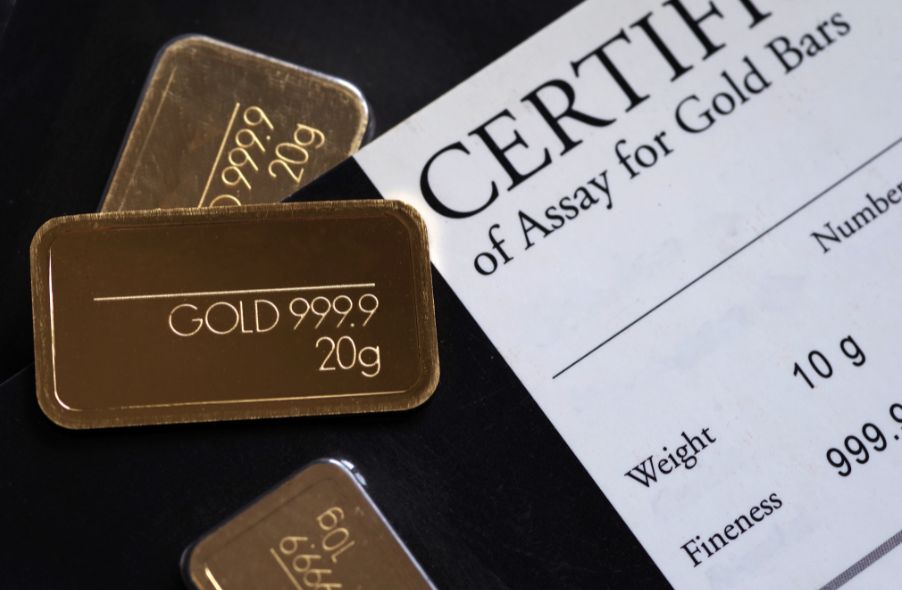
Introduction
Investing in gold has long been considered a stable asset that has preserved its value throughout history. However, the logistics and cost of storing physical gold bullion can deter some investors. In such cases, investing in paper gold becomes an attractive alternative. But is paper gold the right investment choice for you? In this article, we will explore what paper gold is, its benefits, potential risks, and how it compares to physical gold.
What Is Paper Gold?
Paper gold refers to any gold-backed asset that is tied to the spot price of gold but does not involve holding physical metal. It allows investors to tap into the advantages of owning gold without the added costs of delivery, storage, and insurance. There are different types of paper gold investments, including ETFs, digital gold assets, certificates, and gold futures.
Types of Paper Gold Investment
1. Gold Exchange-Traded Funds (ETFs)
Gold-backed ETFs work similarly to traditional stocks. The value of these assets is tied to the price of physical gold, rising or falling accordingly. Investing in gold ETFs involves purchasing shares in the gold assets owned by the fund. When you decide to sell your investment, you receive the equivalent value of your shares in cash.
2. Physical Gold Certificates
Gold investment certificates allow you to own physical gold without physically holding it. Your asset is stored in a physical vault, and the authority issuing the certificates takes care of storage and security. These certificates can be issued by banks or other financial institutions. Alternatively, you can purchase gold bullion online from reputable companies and let the seller handle the storage.
3. Gold Futures Contracts
Gold futures involve agreeing to purchase a specific amount of physical gold at a predetermined price and time in the future. You do not take possession of the metal immediately but rather at the agreed-upon date. Gold futures can be a short-term or long-term investment, giving you the option to sell the contracts before receiving the physical gold or take possession of the gold bullion.
4. Commodity Pools Accounts
Commodity pools are funds that gather, administer, and invest capital from multiple individuals or entities. These pooled gold-backed securities are managed by a professional team. Investors can contribute their resources to purchase different gold assets, with the fund managers making all the investment decisions.

Benefits of Paper Gold
Investing in paper gold offers several advantages over physical gold:
1. Flexibility
With paper gold, you can invest any amount of money you are willing to put into it, whereas physical gold may require bulk purchases to make storage and delivery costs practical.
2. Liquidity
Paper gold assets, such as ETF shares and futures contracts, can be easily converted into cash when market conditions are favorable. Trading can be done through reputable stock exchanges or online platforms, ensuring quick and convenient transactions.
3. Lower Associated Costs
When investing in paper gold, you do not need to pay for shipping, secure storage vaults, or insurance. Your only cost would be the broker's commission. In contrast, the costs of storing and insuring physical gold can accumulate over time.
4. No Storage Concerns
Investing in paper gold eliminates the worry of losing your precious metals or the risk of theft. Your investment is not physically held by you, but rather by the financial institution or fund managing the gold-backed securities.
Risks of Paper Gold Investment
While paper gold offers flexibility and convenience, there are also risks involved:

1. Dependence on Third Parties
Investing in paper gold means relying on the financial institution or fund that issued the gold-backed securities. If the organization faces a crisis due to mismanagement or other reasons, your investment may be at risk.
2. Valuation Gaps
There can be discrepancies between the spot price of physical gold and the value of your gold-backed assets. Factors like tracking errors, management fees, and other considerations can create price discrepancies.
3. Market Volatility
Some paper gold investments, such as gold futures, are more speculative in nature and may be more vulnerable to market fluctuations compared to physical gold.
4. No Physical Metal Ownership
When investing in paper gold, you do not have the satisfaction and security of physically holding the gold bullion.
Should You Invest in Physical Gold?
Despite the added costs and logistics associated with physical gold, it still remains a safe hedge investment. Here are some advantages and disadvantages of owning physical gold:
Advantages of Physical Gold
1. Intrinsic Value
Physical gold holds an ironclad intrinsic value. While paper gold assets can be stable investments, their value may still be influenced by market trends and investment decisions. With physical gold, the asset's value depends less on third parties.

2. Stability
Gold has maintained its value for centuries and is considered a valuable commodity. While gold prices may fluctuate, physical gold will always hold its worth, even in times of economic uncertainty.
3. Security
Unlike digital assets, physical gold is not vulnerable to hacking or cyber threats. It provides a tangible and secure form of wealth.
4. Tradability
Physical gold can be easily exchanged at any time and place. Even in scenarios of economic collapse, gold coins or bars remain a tradable commodity.
Disadvantages of Physical Gold
1. Markup Prices
When purchasing physical gold, you may pay a markup price in addition to the metal's spot price. Larger gold bars typically have lower markups but may be more challenging to sell.
2. Storage and Insurance Costs
Storing a substantial amount of physical gold requires secure storage, which often comes with annual fees. Insurance may also be necessary to protect your precious metal investment.
3. Risks of Theft and Natural Disasters
Physical gold is at risk of theft, and in the event of a natural disaster, your investment may be lost unless adequately insured.
4. Slower Liquidity
While physical gold is always tradable, it may take longer to find a buyer compared to trading paper gold assets. Additionally, dealer fees may apply when selling gold bullion.
Factors to Consider When Choosing Between Physical Gold and Paper Gold
Choosing between physical gold and paper gold investments does not have to be an either-or decision. Diversifying your investment portfolio can provide benefits in both scenarios. Physical gold tends to appreciate in value during economic crises, while paper gold assets may fluctuate. Factors to consider when deciding include:
1. Investment Goals
Consider your investment goals and risk tolerance. If you are comfortable with potential losses and seek short-term gains, paper gold assets like ETFs or futures may be suitable. However, consult an investment advisor before making significant investments.
2. Hedge Against Market Shifts
If you view gold as the ultimate hedge investment, protecting against market shifts, physical gold may be more appealing. It offers financial security during stock market crashes and can serve as a long-term investment for retirement or generational wealth preservation.
3. Backing of Paper Gold Assets
When investing in paper gold, choose funds that are fully backed by physical
Frequently Asked Questions
Is gold IRAs a good way to invest?
The best way to invest in gold is by buying shares in companies that mine for it. This is a good way to make money when you invest in gold and other precious metals like silver.
There are however two problems with owning shares directly.
The first is that you could lose money if your stock is held on for too long. Stocks fall faster than their underlying assets (like gold) when they are declining. This means that you might end up losing more money than you make.
Second, waiting until the market recovers before selling can result in missing potential profits. Therefore, you might need patience and wait for the market recovery before making any profit from your gold investments.
But if you prefer to keep your investments separate from your finances, you can still benefit from owning physical gold. An IRA in gold can diversify your portfolio and protect you against inflation.
Visit our website to find out more about investing in gold.
Is a gold IRA worth interest?
It all depends on how big your investment is. If you have $100,000, then yes. If you have less than $100,000, then no.
The amount of money you put into an IRA determines whether or not it earns interest.
If you are putting in more than $100,000 annually for retirement savings, you should open a regular brokerage account.
There you will earn more interest, but also be exposed to higher risk investments. If the stock market crashes, you don't want all your money to be lost.
An IRA might be more advantageous if you are able to contribute only $100,000 per year. At least, until the market begins to grow again.
Can you keep precious metals inside an IRA
This question is dependent on whether an IRA owner wishes to diversify into gold or silver, or keep them safe.
He can choose to diversify if he so desires. He could either purchase physical bars or silver from a seller, or return these items to the dealer at end of the year. But, what if he doesn't want to sell his precious metal investments? He should keep them, as they are perfectly safe to be stored in an IRA account.
What are the pros and disadvantages of a gold IRA
An excellent investment vehicle is a gold IRA. This is for people who wish to diversify but do not have access to traditional banking services. You can invest in precious metals like gold, silver, or platinum, without having to pay taxes until the gains are withdrawn.
There is a downside to this: if you withdraw your earnings early, you'll be subject to normal income tax. But because these funds are held outside of the country, there is little chance of them being seized by creditors when you default on your loan.
If you are looking to own gold without worrying about taxes, a golden IRA could be for you.
Statistics
- The IRS also allows American Eagle coins, even though they do not meet gold's 99.5% purity standard. (forbes.com)
- Depending on your financial situation, most experts recommend you invest no more than 5% to 10% of your retirement funds in precious metals. (forbes.com)
- You can only purchase gold bars of at least 99.5% purity. (forbes.com)
- Same tax rules as traditional IRA SEP IRA contributions in 2022 are limited to 25% of compensation or $66,000, whichever is less Before setting up a Silver IRA, understand the fees and IRS restrictions. (sltrib.com)
External Links
investopedia.com
forbes.com
- Gold IRA: Add Some Sparkle To Your Retirement Nest Egg
- Understanding China's Evergrande Crisis – Forbes Advisor
en.wikipedia.org
takemetothesite.com
How To
How to decide if a Gold IRA is right for you
The most popular type of retirement account is the Individual Retirement Account (IRA). IRAs may be obtained from financial planners or banks as well as mutual funds and banks. Individuals are allowed to contribute up to $5,000 each year to IRAs without having to pay tax consequences. This amount can be deposited into any IRA, regardless your age. You can only put a certain amount into an IRA, but there are restrictions. For example, a Roth IRA contribution is not allowed if you are less than 59 1/2. Contributions must be made by those under 50 years old. Additional, employees who work for their employer might be eligible to receive matching contributions.
There are two main types: Roth and traditional IRAs. A traditional IRA lets you invest in stocks, bonds, real estate, and other investments, while a Roth IRA lets you invest only in after-tax dollars. Roth IRA contributions can be made without tax, but they will still be subject to taxes if you withdraw from it. A combination of both accounts may be preferred by some people. Each type is different. There are pros and con's to each. How do you choose the best type of IRA for you? Here are three things to keep in mind:
Traditional IRA Pros
- Companies have different options when it comes to contribution options
- Employer match possible
- It is possible to save more than $5.000 per person
- Tax-deferred Growth until Withdrawal
- Income level may be a factor in some restrictions
- Maximum contribution limit for married couples is $5500 annually ($6,500 jointly).
- The minimum investment required is $1,000
- After age 70 1/2, you must begin taking mandatory distributions
- To open an IRA, you must be at least 5 years old
- You cannot transfer assets between IRAs
Roth IRA Pros:
- Contributions are tax-free
- Earnings increase tax-free
- No minimum distributions
- Stocks, bonds, and mutual fund investments are the only options.
- There is no maximum allowed contribution
- No limitations on transferring assets between IRAs
- To open an IRA, you must be 55 years old or older
Considering opening a new IRA, it's essential to know that not all companies offer the same IRAs. For example, you might be able to choose between a Roth IRA (or a traditional one) from some companies. Others offer the possibility to combine them. It is also important to note that different types IRAs will have different requirements. Roth IRAs don't have a minimum capital requirement. Traditional IRAs only require a $1,000 minimum investment.
The Bottom Line
The most important factor when choosing an IRA is whether you plan to pay taxes immediately or later. If you're planning to retire in the next ten-years, a traditional IRA may be the best option. A Roth IRA may be a better choice for you. In either case, it's a smart idea to speak with a professional about your retirement plans. It's important to have someone who is knowledgeable about the market and can suggest the best options for you.
—————————————————————————————————————————————————————————————-
Based on [POSTTITLE]
by [POSTAUTHOR]

















